How To Earn A Place In Featured Snippets?
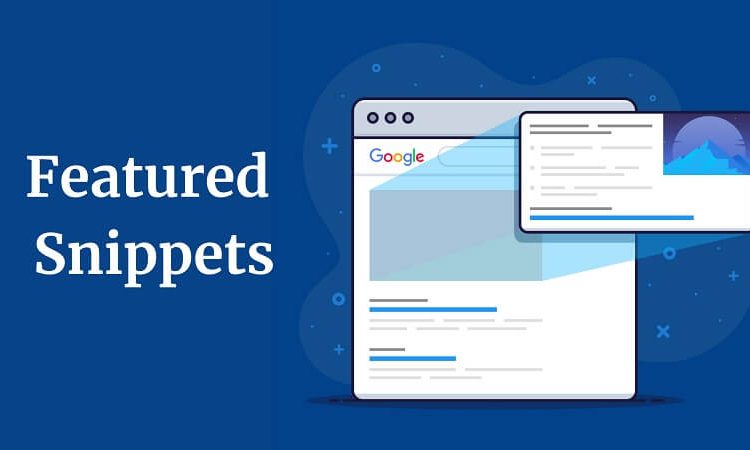
Hello guys, today in this article, we are going to discuss how to earn a place in featured snippets. So keep reading.
Content is a powerful tool when it comes to marketing in today’s digitized world. While there may be many ways to make your most top-notch content stand out, you also need to focus on how to increase traffic on your site and have maximum customer engagement.
In this article, you will learn how to gain the featured snippet position. Read on to find out everything you need to know about featured snippets.
What Is A Featured Snippet?
Featured snippets are first-place results that appear below the paid ads on Google but above first-place results in SERPs (Search Engine Results Page). They are brief excerpts from a webpage that answer a search query.
SEMRush and Brado did a study of 160 million keywords on desktop and 46.1 million keywords on mobile. Their research discovered that 19% of SERPs had featured snippets, with 7.3% having double snippets. The industries with the most featured snippets were travel, computer and electronics, art and entertainment, and science.
If you’re wondering what a featured snippet looks like, consider the image below:
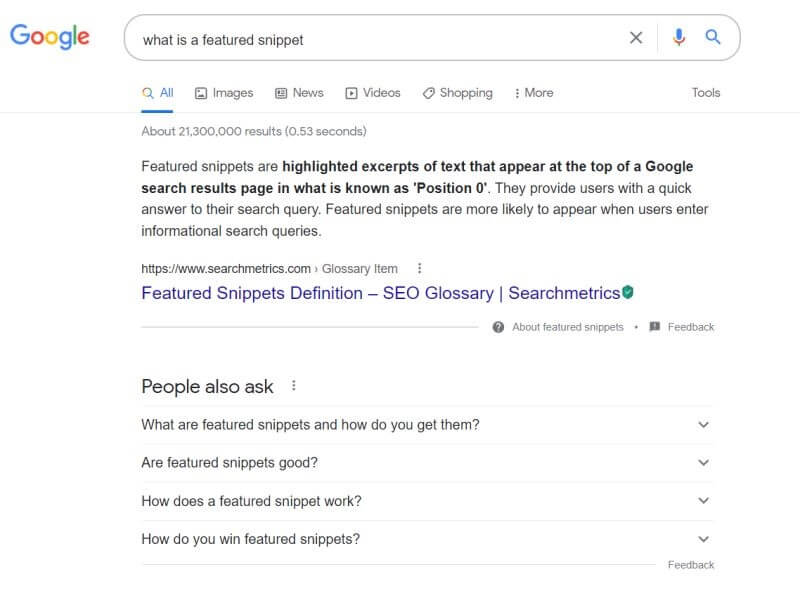
A featured snippet gives you an edge over competitors. It is the highest listing in the search results, and the listing is prominently displayed. If you can claim the featured snippet, you will gain most of the clicks for that search result.
Featured snippets also give your voice authority, making searchers feel like they can trust your word on a subject.
How To Earn A Featured Snippet In Six Steps
There are a few steps you need to follow to earn your featured snippet. The following steps will help you capture one of those coveted featured snippets. Let’s dive into the main part of this guide.
1. Identify Relevant Keywords To Target
To earn a place in a featured snippet, you must target relevant terms. You will be mainly targeting questions, terms, and definitions.
The wise words of Neil Patel, “If your content doesn’t answer questions, it won’t get into the featured snippet. That’s all there is to it,” are indeed true.
The simplest way to approach this research phase is to Google the term you wish to rank for and see if a featured snippet pops up. If one does, you can target that term.
You can do this keyword research with an SEO tool if you choose.
2. Analyze Competitors Snippets
Once you’ve identified the featured snippet that you want to target, do some competitor analysis. Review the featured snippets that already exist and that you’re targeting. See how and from where Google gathered the information from a web page.
Take this example about the best time to plant potatoes.
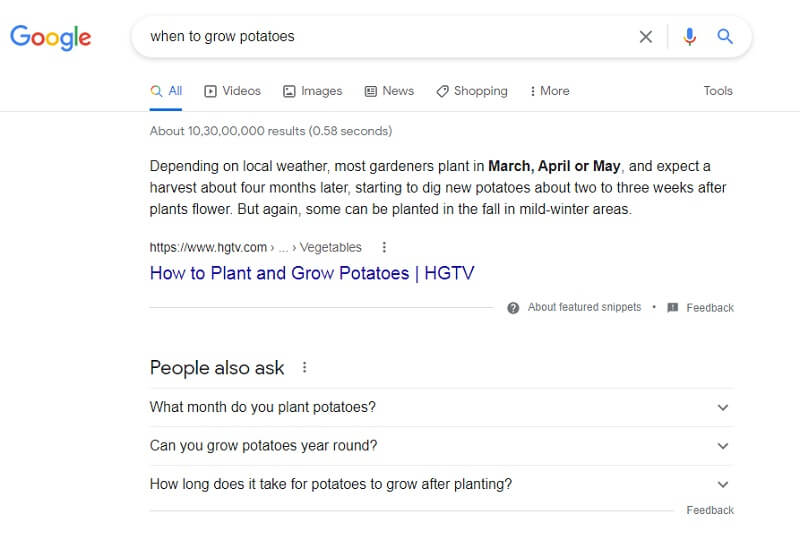
You can see that the featured snippet has picked out two sentences. There are no ellipses in the content, which means that Google hasn’t had to force content together to create an answer.
If there are ellipses, that’s a good sign. It means you can improve on the result.
When you visit the page, check where the information was gathered. In the case of the potato example, it appears towards the end of a heading titled “When to Plant Potatoes”.

That means the person who wrote the blog post didn’t intentionally target the featured snippet. They just happened to produce the best answer.
When reviewing the content, check the structure of the article. Tools like the Detailed Chrome extension are useful for this type of research.
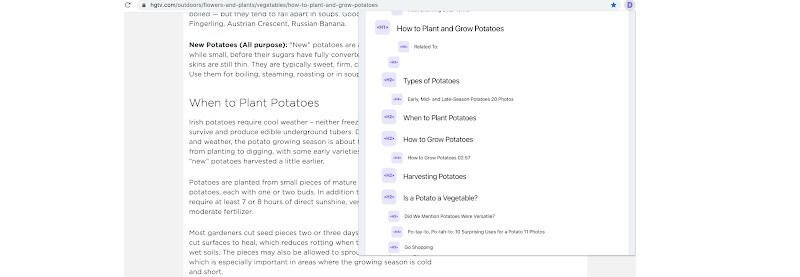
A tool like Detailed can provide fast insights into the kinds of headings you should use in your content. A quick scan of the content will normally reveal more headings you could incorporate that would allow you to target featured snippets.
Another way to create insightful content is by sending emails to your customers to figure out their needs and interests. Using an email lookup tool could help you streamline this process and increase engagement.
3. Break Content Into Headings
Once you’ve done your research, you need to optimize your page and give it a clear structure. Underneath the headings, you can add a concise paragraph that answers the featured snippet.
You should try to optimize relevant headings, and the subsequent paragraphs, in your content for keywords. Take this example from Nextiva targeting the keyword “what is VoIP”.
Like the Hubspot example I shared earlier, they have a clear definition directly below the heading. It’s like a mini question-and-answer format.

The VoIP article has targeted several featured snippets. You can see this when you use Detailed to analyze the headings used in the post.
For example, following “What is VoIP?”, you have the heading “How does VoIP work?”

Creating an article outline like this is good practice. If you can capture one featured snippet and searchers like your answer, there’s a good chance that Google will allow you to capture additional snippets.
After all, Google just wants to provide the best user experience to searchers.
4. Create A One-Paragraph Answer Under Your Heading
Immediately below the relevant heading, write a paragraph that deserves to be a featured snippet. The optimal length of a featured snippet is around 300 characters. You need to make sure you include relevant and to-the-point information as your character count is limited.
Your description should be concise. In two to three sentences, define a term, or answer a question. You want a piece of content that Google can lift directly from your article and place in the featured snippet. That content needs to answer the question a person doing a search online posed.
5. Create A Great Article Targeting The Question
When creating your article, ensure that your content provides value to readers in addition to targeting featured snippets.
Let me use this article from Hubspot targeting the keyword “eCommerce Marketing” as an example. You can see they have captured the featured snippet with this post.
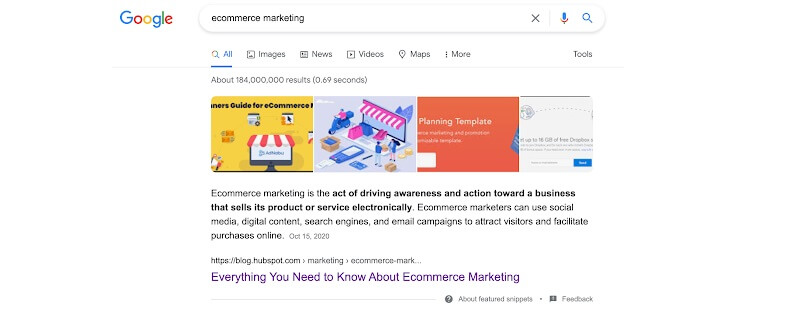
When you look on the page, you can see how they did that.
Directly under the introduction, they have a heading underneath which you have a definition. The featured snippet combines the one-sentence definition with the first sentence of the subsequent paragraph.

That definition is easy for Google to scan and people to understand. The definition has value, which is why Hubspot secured the featured snippet.
The article was created to do more than just capture the featured snippet position. It’s a comprehensive guide to eCommerce marketing. People who click through from the featured snippet to Google would find the content valuable.
6. Use FAQ And How-To Pages
Finally, if you want to target featured snippets, add a FAQ section to your content. FAQ and how-to pages massively increase your chances of being featured on a snippet because they directly answer people’s questions.
The FAQ section should have a question, in the form of a heading, with a concise answer below. You can expand on that answer if you choose. The basic idea here is to capture various featured snippets that are relevant to the topic you are covering.
In Conclusion
When users search for a specific question related to a product or service, they appreciate a quick answer. If they are satisfied with what they are reading, they’re likely to stick to that page and not spend time looking elsewhere on the web. A dedicated customer may seem hard to find, but it is surely not impossible.
When looking to earn a place in a featured snippet, there are many factors one should keep in mind. While there may be no black-and-white solution to get featured in a snippet, you need to have patience and, above all, carry out the necessary research needed.
From analyzing your competitors’ featured snippets to picking the right keywords using modern tools, there are several things you can do to achieve your goal. Whether you end up getting a featured snippet or not at the end may be pure luck, but it’s definitely worth a try!
Bio
Owen Baker is a content marketer for Voila Norbert, an online Email verification tool. He has spent most of the last decade working online for a range of marketing companies. When he’s not busy writing, you can find him in the kitchen mastering new dishes.

